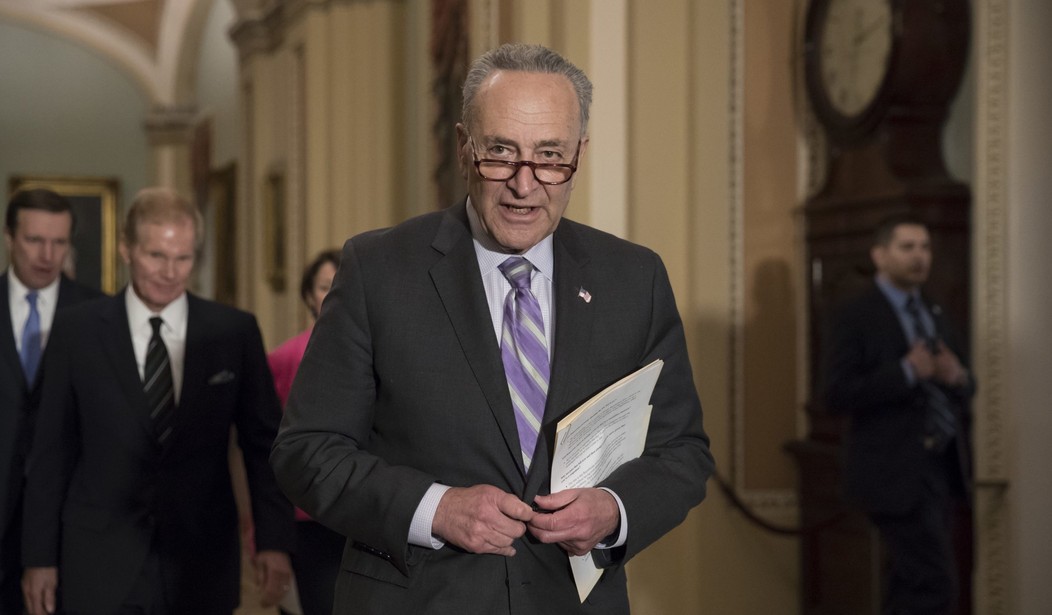On Tuesday, Sen. Susan Collins (R-Maine) told reporters that President Donald Trump’s Supreme Court nominee, Brett Kavanaugh, stood by the abortion decision Roe v. Wade (1973) as “settled law.” Liberals immediately pounced, suggesting that this answer was a dodge.
“This is not as simple as Judge Kavanaugh saying that Roe is settled law,” Sen. Chuck Schumer (D-N.Y.) declared. “Everything the Supreme Court decides is settled law until it unsettles it. Saying a case is settled law is not the same thing as saying a case was correctly decided.”
Schumer suggested that Kavanaugh’s remarks were “no different than the typical judicial dodge of saying you respect stare decisis [the idea that previous Supreme Court rulings should stand in most cases]. Time and time again, judges nominated to the Supreme Court by Republican presidents have told the Senate they would follow judicial precedent, only to overturn it once they’re on the bench.”
.@SenSchumer: "Of course, we know Roe is settled law. We need to know if Judge Kavanaugh believes it was correctly decided. That's the key question I will ask him. Otherwise, no one can be assured he won't vote to unsettle it…" pic.twitter.com/xWNFB1byh2
— CSPAN (@cspan) August 21, 2018
NARAL Pro-Choice America, a prominent abortion group, agreed. “With all due respect to Senator Collins, ‘settled law’ means nothing,” NARAL President Ilyse Hogue said in a statement. “It is a bunch of code words, long used by many conservative judges, meant to hide their real beliefs and anti-choice record.”
Hogue went on to say that “Donald Trump would not have nominated Brett Kavanaugh unless he would live up to Donald Trump’s stated goal of gutting Roe v. Wade and criminalizing abortion.”
Indeed, Trump did promise to name judges to the Supreme Court who would overturn Roe v. Wade, but this does not entail “criminalizing abortion” as NARAL falsely claimed. As Trump said in a presidential debate, “it will go back to the states, and the states will then make a determination.” Overturning Roe would not involve criminalizing abortion, but reopening the issue to the fifty states.
“Most troubling of all is Senator Collins’ reference to Roberts today,” Hogue continued. “Roberts has voted in lockstep with anti-abortion forces on every vote since joining the Court.”
Brian Fallon, a former aide to former Sen. Hillary Clinton (D-N.Y.), Schumer, and former Attorney General Eric Holder, tweeted, “This means nothing. Susan Collins must take her constituents for fools to think they will not see through this.”
“After calling Roe ‘settled law’ in 2005, Roberts voted in 2016 in favor of Texas’ anti-abortion law that forced closure of dozens of clinics,” Fallon added. “Kennedy was deciding vote to overturn the law. Kavanaugh must be asked if he thinks that case – Whole Women’s Health – was rightly decided.”
After calling Roe "settled law" in 2005, Roberts voted in 2016 in favor of Texas' anti-abortion law that forced closure of dozens of clinics. Kennedy was deciding vote to overturn the law. Kavanaugh must be asked if he thinks that case – Whole Women's Health – was rightly decided
— Brian Fallon (@brianefallon) August 21, 2018
In Whole Woman’s Health v. Hellerstedt (2016), the Supreme Court struck down two provisions in a Texas law that would have held abortion clinics to higher medical standards. Liberal Justice Stephen Breyer wrote the majority opinion, arguing that these provisions placed a substantial obstacle in the path of women seeking an abortion. Thus, the liberals on the Court made abortion such an important constitutional right that it overrode concerns about the health of women getting abortions.
Roberts rightly dissented in Whole Women’s Health, and contrary to Fallon’s assertion, that case would not have overturned Roe v. Wade. Rather, the Texas law would have made sure that abortion clinics live up to certain high medical standards to ensure the safety of women who get abortions. Under liberal jurisprudence, abortion has been made into a penultimate right, ironically under the 14th Amendment, which was ratified at a time when the states were passing tougher laws against abortion.
In opposing Kavanaugh, Sen. Chris Murphy (D-Conn.) tweeted an article that helped explain why the abortion “rights” push of Roe v. Wade and other Supreme Court decisions is so egregious.
Naturally, Murphy attacked the Supreme Court nominee. “Make no mistake – when we talk about putting Judge Kavanaugh on the Supreme Court, reproductive health care, LGBTQ rights, voting rights and more are on the line,” the senator wrote.
Make no mistake – when we talk about putting Judge Kavanaugh on the Supreme Court, reproductive health care, LGBTQ rights, voting rights and more are on the line. #WhatsAtStake https://t.co/0AwvJxogdR
— Chris Murphy (@ChrisMurphyCT) August 21, 2018
His tweet shared an article from USA Today’s Richard Wolf delving into Kanaugh’s positions on various issues. Kavanaugh only has one ruling relevant for abortion, and in that case he wrote that government “has permissible interests in favoring fetal life, protecting the best interests of a minor and refraining from facilitating abortion.”
In a speech last year however, Kavanaugh praised the late Chief Justice William Rehnquist, citing Rehnquist’s dissent from Roe. Rehnquist “stated that under the court’s precedents, any such unenumerated right had to be rooted in the traditions and conscience of our people.”
This complaint, buried in an attack piece against Kavanaugh, proves quite illuminating. According to the 9th Amendment, “the enumeration in the Constitution, of certain rights, shall not be construed to deny or disparage others retained by the people.” This means that if abortion were considered a right at the time of the founding, it would have to be considered a right after the Constitution was established.
Abortion was never considered a right until 1973, however. Roe v. Wade reinterpreted the Constitution to create a right to abortion — a right that was never explicit or intended by the founders or by the authors of later constitutional amendments.
Kavanaugh is an originalist, meaning that he will support the Constitution as written and as understood by those who wrote it. Sadly, an activist Supreme Court has taken it upon itself to make law, reinterpreting the Constitution to mean things it was never meant to mean.
If Congress or the states wanted to amend the Constitution to create a right to abortion, they certainly would be able to do so. The Congress could pass a law legalizing abortion. Instead of these avenues, the Supreme Court twisted the Constitution to declare that state laws against abortion are unconstitutional.
If Kavanaugh were to strike down Roe v. Wade, that would not make abortion illegal. As Trump said, it would open up the issue once again to the states and to Congress.
Even so, Kavanaugh said he considers Roe v. Wade “settled law.” He may defend the rights of the unborn on the bench, and he may even overturn the decision, but calling Roe “settled law” signals that he will not easily overturn it. This doesn’t mean nothing, but abortion activists are right to be suspicious.
They are utterly wrong to suggest that Roe was rightly decided, and that overturning Roe means criminalizing abortion. These — like the ridiculous “Handmaid’s Tale” protests — are mere posturing and scare tactics.









Join the conversation as a VIP Member